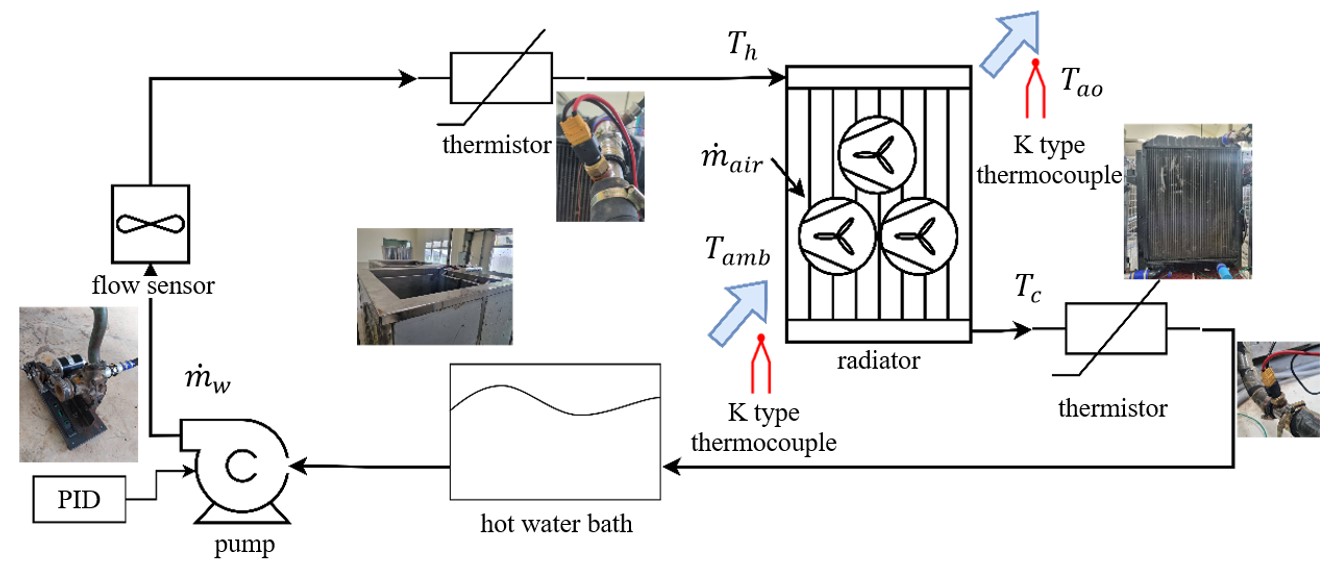Efficiency and Control: Modelling and Validation of an Electric Fan Bus Cooling System
Main Article Content
Abstract
The cooling systems in the majority of passenger buses typically depend on mechanical or hydraulic cooling systems. These systems utilize the engine's generated energy to function, leading to increased engine workload and higher fuel consumption. However, an electric cooling system presents the advantage of reducing the engine's workload and providing enhanced control. This paper focuses on modelling, validating, and presenting experimental results of an electric fan cooling system. Based on the accuracy assessment of the heat exchange system's mathematical model studied in this research, the evaluation was conducted using the Root Mean Square Error (RMSE) of the mathematical model's response compared to the actual system response obtained from experiments. It was observed that the RMSE of the outlet air temperature is 0.50, and the RMSE of the cooling water temperature at the water outlet is 0.21. Therefore, it can be concluded that the estimated mathematical model is accurate and closely approximates the real system. Additionally, it aims to utilize the benefits of the mathematical model to design a control system specifically tailored to the engine's operating conditions.
Article Details

This work is licensed under a Creative Commons Attribution-NonCommercial-ShareAlike 4.0 International License.
This work is licensed under a Creative Commons Attribution-NonCommercial-ShareAlike 4.0 International License.
References
Zhao G, Wang X, Negnevitsky M, Li C. An up-to-date review on the design improvement and optimization of the liquid-cooling battery thermal management system for electric vehicles. Appl Therm Eng. 2023;219:119626.
Fonseca L, Olmeda P, Novella R, Valle RM. Internal Combustion engine heat transfer and wall temperature modeling: an overview. Arch Computat Methods Eng. 2020;27(5):1661-1679.
Park S, Woo S, Kim M, Lee K. Thermal modeling in an engine cooling system to control coolant flow for fuel consumption improvement. Heat Mass Transfer. 2017;53(4):1479-1489.
Banjac T, Wurzenberger JC, Katrašnik T. Assessment of engine thermal management through advanced system engineering modeling. Adv Eng Softw. 2014;71:19-33.
Lu L, Chen H, Hu Y, Gong X, Zhao Z. Modeling and optimization control for an engine electrified cooling system to minimize fuel consumption. IEEE Access. 2019;7:72914-72927.
Haghighat AK, Roumi S, Madani N, Bahmanpour D, Olsen MG. An intelligent cooling system and control model for improved engine thermal management. Appl Therm Eng. 2018;128:253-263.
Kim KB, Choi KW, Lee KH, Lee KS. Active coolant control strategies in automotive engines. Int J Automot Technol. 2010;11:767-772.
Khanjani K, Deng J, Ordys A. Controlling variable coolant temperature in internal combustion engines and its effects on fuel consumption. SAE Tech Pap. 2014:2014-32-0064.
Mureșan C, Harja G. Modeling and controlling the cooling system of an IC vehicle. Int J Model Optim. 2021;11(3):80-85.
Castiglione T, Pizzonia F, Bova S. A novel cooling system control strategy for internal combustion engines. SAE Int J Mater Manuf. 2016;9(2):294-302.
Abdulhamitbilal E, Jafarov EM. Cooling control system with sliding mode approach for electrical vehicle with range extender. The 15th International Workshop on Variable Structure Systems (VSS); 2018 Jul 9-11; Graz, Austria. USA: IEEE; 2018. p. 267-272.
Gu N, Ni JM. Simulation of engine cooling system based on AMESim. 2009 Second International Conference on Information and Computing Science; 2009 May 21-22; Manchester, UK. USA: IEEE; 2009. p. 117-120.
Mohamed M, Shedid MH, El-Demerdash MS, Fatouh M. Performance of electronically controlled automotive engine cooling system using PID and LQR control techniques. IOSR-JMCE. 2018;15(3):42-51.



